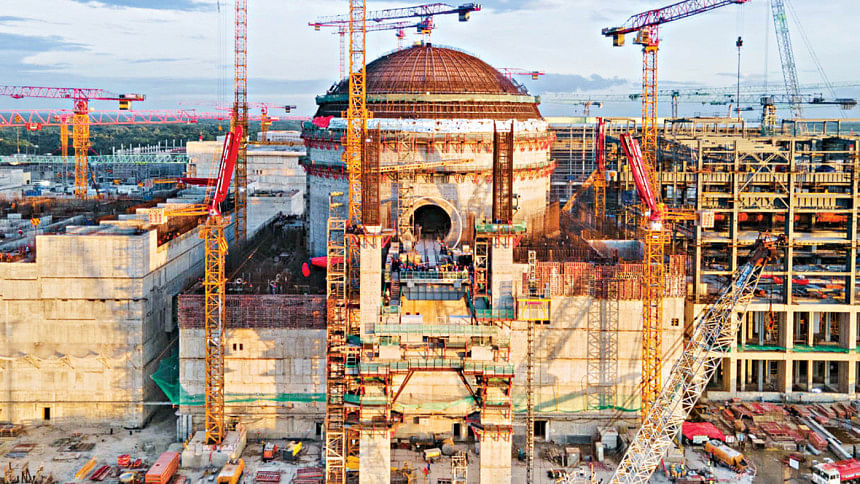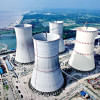Rooppur nuclear power plant: Cost may rise for multiple factors

Rooppur Nuclear Power Plant Project may see a cost rise due to slow progress in power grid upgrade, possible changes in the loan repayment method amid the Russia-Ukraine war and the devaluation of the taka.
The Tk 113,092-crore plant has two units with a power generation capacity of 1,200 megawatts each. Of the amount, Tk 91,040 crore ($11.38 billion) will be provided by Russia as loan, according to an agreement.
Project officials said the first unit will be ready for commercial operation in December 2023 and the second one in July 2024.
The plant, however, may face delay in going into commercial operation as the Infrastructure Development for Power Evacuation Facility, scheduled to be completed by December next year, has seen only 27 percent financial progress and 45 percent physical progress in nearly five years till September this year.
Talking to reporters at the plant site recently, Shawkat Akbar, project director of Rooppur Nuclear Power Plant, said they would not be able run the plant until the power grid upgrade is done under the infrastructure development facility.
"Once we use nuclear fuel in the plant, we can't stop production," he pointed out.
Work of the infrastructure development facility under the Power Grid Company of Bangladesh (PGCB) began in April 2018 at a cost of Tk 10,981 crore with Tk 8,219 crore funding from the Indian Line of Credit.
The project's aim is to ensure power evacuation from the nuclear power plant and qualitative upgradation of the power system for the integration and safe operation of the Rooppur plant.
Prime Minister Sheikh Hasina on October 19 inaugurated the second and final reactor of the plant, marking the most important development in the country's first nuclear power project.
Talking to reporters a day before the second reactor's installation, Science and Technology Minister Yeafesh Osman said it wouldn't be possible to start operation of the plant until the power grid line is ready to take electricity from the plant.
Asked whether the transmission line would be ready in due time, he said, "I'm not in a position to answer that. They [PGCB] are trying to ready the grid as per the deadline.
"If the grid is not ready in due time, it will be a loss for the country."
Following international sanctions on Russia over its war against Ukraine, Moscow sent a proposal to Dhaka in June, seeking loan repayment in the ruble instead of US dollar, a move, which, according to the Economic Relation Division (ERD), would increase the loan servicing cost.
According to the agreement signed in July 16, 2016, Bangladesh was supposed to repay the loan in dollars.
In August, Moscow sent a fresh proposal to Dhaka, asking the latter to amend the agreement and change the payment modality, the payment gateway and the currency for repaying the loan.
Russia asked Bangladesh to consider repaying the loan to its account with a Chinese bank in China. There, the dollar will be converted to the yuan and then to the ruble.
In late February, key Russian banks were expelled from SWIFT, the high-security system that enables financial transactions all around the world, over Russia's war against Ukraine.
Regarding the Russian proposal, Yeafesh said, "I'm not in a position to comment on this. The issue lies with the finance ministry.
"However, I can say both Bangladesh and Russia are trying to solve the matter amicably."
In reply to a query, Yeafesh claimed there is no possibility of a project cost rise as all the things had already been fixed.
Shawkat said talks are underway on the mode of loan repayment, which will start two years after the plant begins commercial operation.
"A team of the [science and technology] ministry is reviewing Russia's freshproposal," he said.
ERD officials said a change in the mode of payment means Bangladesh would have to change the currency multiple times, which would raise the cost of loan as well as risks stemming from the exchange rate volatility.
"Since Bangladesh is not responsible for the unexpected situation, our efforts would be to ensure we don't bear any additional financial burden for that," said a financial ministry official seeking anonymity.
When the loan agreement was signed, the exchange rate was below Tk 85 against a dollar. Now it has shot up to Tk 103. And by the time Bangladesh will start repaying the loan two years after the plant begins commercial operation, an additional amount has to be paid due to devaluation of the taka.
As per the current exchange rate, the Russian loan of $11.38 billion stands at Tk 117,214 crore, which was Tk 91,040 crore during the signing of the deal in 2016, as the taka lost value against the dollar during the period.
The government listed this mega project on 1,062 acres of land in Pabna as one of the top-10 priority or fast-track projects to be completed in due time.
The construction of the nuclear power plant began in November 2017. Once it's completed, Bangladesh will become the third Asian country after India and Pakistan to harness the power of the atoms.

 For all latest news, follow The Daily Star's Google News channel.
For all latest news, follow The Daily Star's Google News channel. 








Comments